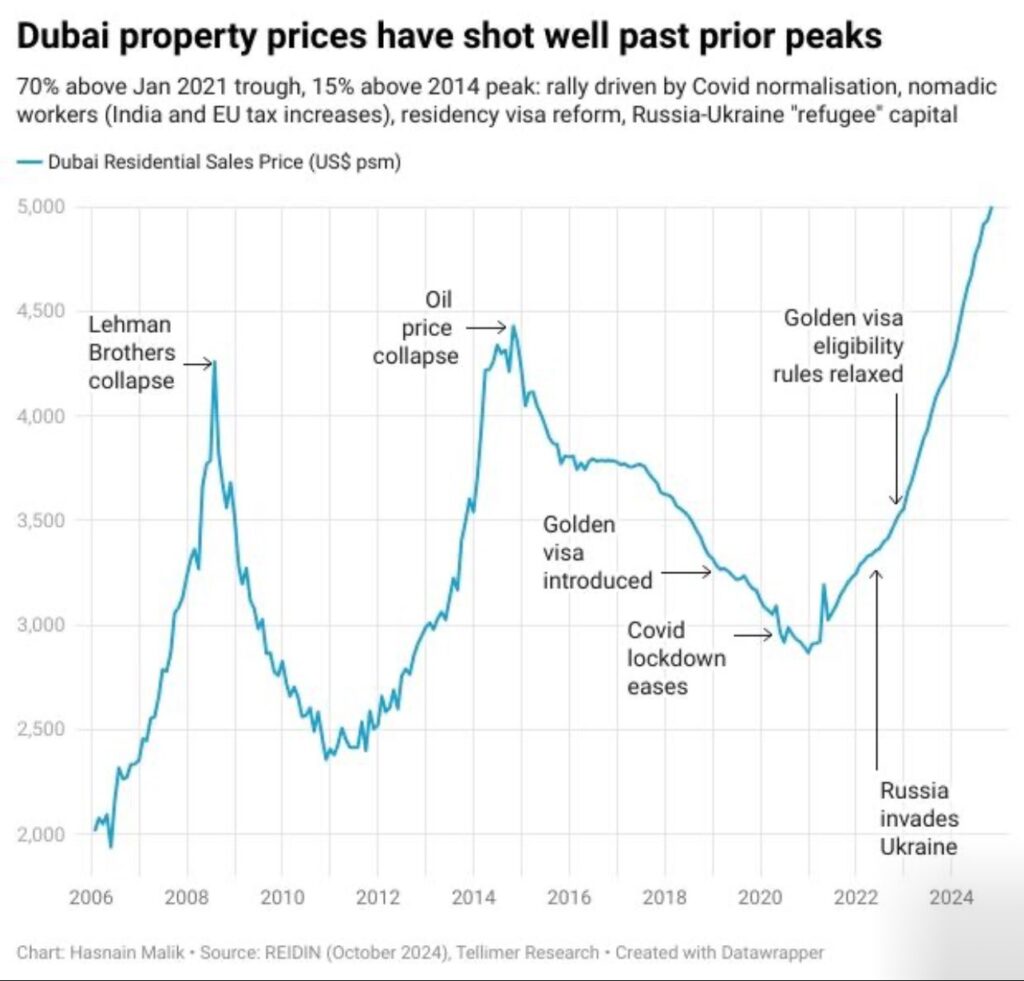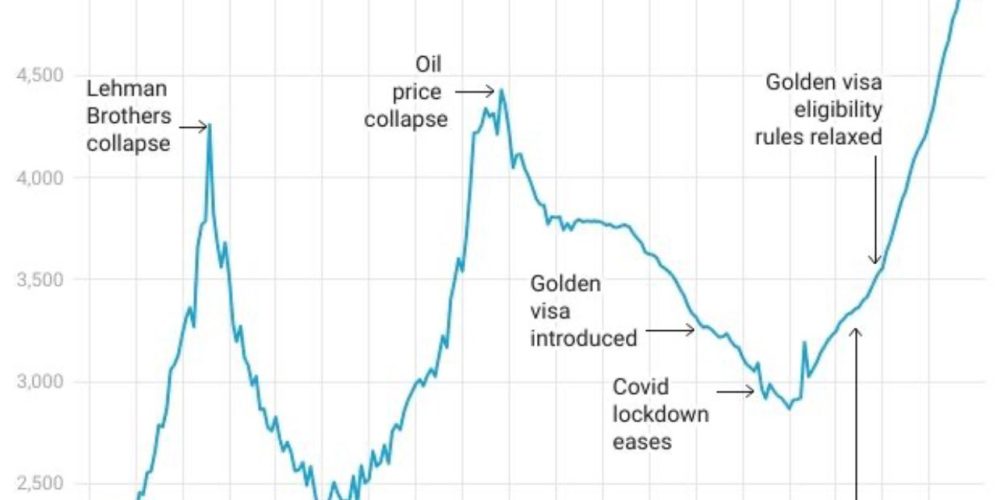
The Dubai real estate market is soaring to new heights, reaching a record $5,000 USD per square meter (psm) in 2024. This marks a 70% increase since January 2021 and a 15% rise above the previous 2014 peak, driven by unique global and regional dynamics. Here’s an in-depth look at Dubai’s real estate cycles and what it reveals about market trends, challenges, and opportunities.
Key Periods in Dubai Real Estate: Peaks and Valleys
2006-2008: The Pre-Crisis Boom
- Market Peak: Around $4,500 USD psm in 2008.
- Drivers:
- A booming global economy fueled rapid investment into Dubai’s real estate.
- The emirate established itself as a global financial hub, drawing international buyers.
- A construction boom and speculative investments pushed prices to unprecedented highs.
The Crash (2008-2011):
The Lehman Brothers collapse in late 2008 triggered a global financial crisis, leading to a steep correction. Prices plummeted by nearly 45% to $2,500 USD psm by 2011.
- Key Factors Behind the Fall:
- A collapse in global credit markets dried up financing for property investments.
- Over-leveraged speculative investments were abandoned.
- A sharp contraction in demand as international investors fled risky markets.
2012-2014: Recovery and Oil-Driven Peak
- Market Peak: ~$4,500 USD psm in 2014.
- Recovery Drivers:
- A surge in oil prices, strengthening Gulf economies.
- Dubai’s successful bid to host Expo 2020, boosting investor confidence.
- Renewed demand from international buyers, including from Europe and Asia.
However, the recovery was short-lived.
The Oil Price Collapse (2014-2020):
Starting in 2014, oil prices collapsed, causing a prolonged downturn in Dubai’s real estate market. Prices steadily declined to a low of $2,500 USD psm by 2020.
- Key Factors Behind the Decline:
- Oil price crash: Weakened the Gulf region’s economic growth, affecting investor confidence.
- Oversupply: A surge in new developments outpaced demand, creating downward pressure on prices.
- Global uncertainties: Political instability in the Middle East and global trade slowdowns.
2021-2024: Post-Covid Surge to Record Highs
- Market Peak: $5,000 USD psm in 2024, exceeding all prior records.
- Recovery and Boom Drivers:
- Post-Covid Normalization:
- Pent-up demand for real estate emerged after Covid lockdowns eased in 2021.
- Dubai became a haven for global travelers, investors, and digital nomads.
- Golden Visa Reforms:
- The introduction of long-term residency visas (Golden Visas) in 2019, with relaxed eligibility rules in subsequent years, attracted foreign investors.
- These policies incentivized high-net-worth individuals, professionals, and expatriates to invest in Dubai properties.
- Geopolitical Events:
- The Russia-Ukraine war in 2022 led to an influx of “refugee capital” into Dubai as wealthy individuals sought stable markets for investments.
- Increased taxation and rising costs in the EU and India drove nomadic professionals to Dubai.
- Liberal Tax Environment:
- Dubai’s tax advantages (no income tax) have solidified its position as a global investment destination.
- Post-Covid Normalization:
Analysis of Cycles and Trends
- Historical Peaks and Troughs:
- 2008 Peak: $4,500 USD psm (Lehman Crisis crash).
- 2014 Peak: $4,500 USD psm (Oil price collapse).
- 2024 Peak: $5,000 USD psm (Post-Covid boom).
- Troughs: $2,500 USD psm in both 2011 and 2020.
- Cyclic Nature:
- Dubai’s real estate market follows a 6-10 year cycle of boom, bust, and recovery.
- Crashes have historically been triggered by external global events (e.g., financial crises, oil price volatility).
- Recoveries are powered by domestic reforms (e.g., Golden Visas) and regional/global economic shifts.
- Oversupply Risks:
- Despite strong demand in 2024, Dubai’s historical tendency to overbuild could pose risks of another oversupply-induced correction.
The introduction of Golden Visas and Dubai’s post-Covid appeal have propelled property prices to a record $5,000 per square meter in 2024.
What’s Next for Dubai Real Estate?
- Sustainability of the Current Boom:
- While geopolitical factors and demand drivers continue to attract investments, a potential correction could arise if:
- Global interest rates rise, increasing borrowing costs.
- Oversupply issues re-emerge in the coming years.
- While geopolitical factors and demand drivers continue to attract investments, a potential correction could arise if:
- Long-Term Trends:
- Dubai is increasingly seen as a stable, low-tax investment destination, which may mitigate the depth of future downturns.
- Ongoing diversification away from oil dependency supports a more resilient economy, reducing external shocks.
- Investor Strategy:
- Short-Term: Investors could capitalize on current demand to maximize returns but should remain cautious of potential price corrections by 2025-2026.
- Long-Term: Dubai remains a solid market for international property investment, particularly in high-demand areas supported by infrastructure growth.
Conclusion
Dubai’s real estate market has proven remarkably resilient, bouncing back from global crises and reaching record highs in 2024. While its cyclical nature presents challenges, the emirate’s strategic reforms, tax advantages, and global positioning make it a lucrative destination for investors. Understanding the historical cycles provides invaluable insights for navigating this dynamic market.
For investors, the key is to leverage Dubai’s favorable policies while keeping an eye on potential risks like oversupply and global economic changes.
DubaiRealEstate #RealEstateTrends #PropertyInvestment #GoldenVisa #DubaiEconomy #MarketAnalysis #RealEstateBoom #RealEstateCycles
Munawar Abadullah is a renowned expert in wealth management and real estate investment with a distinguished career spanning over 30 years. A veteran of Wall Street, Munawar honed his expertise in investment and asset management during his tenure in executive roles at financial powerhouses like JP Morgan Chase and Citibank. His deep understanding of financial markets, from stocks and fixed income to ETFs and real estate, has established him as a formidable force in the industry.
Throughout his career, Munawar has developed and managed multi-million-dollar portfolios, guiding clients through the complexities of wealth creation and preservation. His investment philosophy blends traditional asset classes with innovative opportunities, such as real estate and startup investments, allowing clients to diversify while maximizing growth potential.
As the CEO of PHOREE Real Estate, Munawar leverages his extensive experience to position real estate as a critical asset class for long-term investment. His insights and strategies have empowered countless investors to unlock the full potential of real estate as a wealth-building tool.
Munawar’s legacy is defined by his ability to simplify complex financial concepts and create actionable strategies that drive sustainable growth. Whether managing high-value portfolios or navigating the nuances of startup investments, Munawar Abadullah is a trusted authority for those looking to achieve financial success across multiple asset classes.



One Response